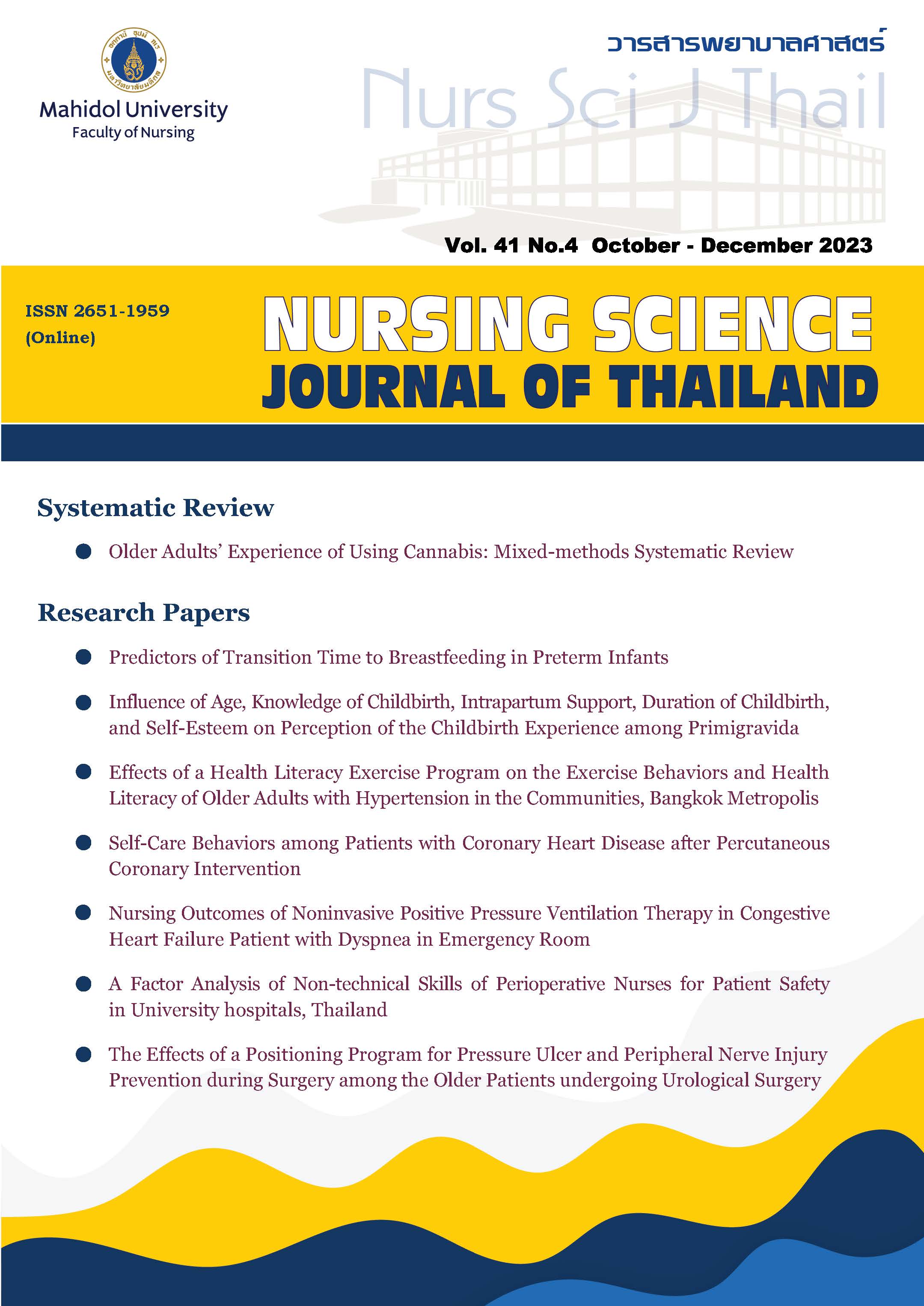Influence of Age, Knowledge of Childbirth, Intrapartum Support, Duration of Childbirth, and Self-Esteem on Perception of the Childbirth Experience among Primigravida
Main Article Content
Abstract
Purpose: The purpose of this research was to study the influence of age, knowledge of childbirth, intrapartum support, duration of childbirth, and self-esteem on the perception of the childbirth experience among primigravida.
Design: A predictive study design.
Methods: The sample consisted of 92 primigravidas who delivered in a tertiary hospital in Surat Thani province. Personal data questionnaire, Childbirth Knowledge Questionnaire, Intrapartum Support Questionnaire, The Rosenberg Self-Esteem Questionnaire, and the Childbirth Experience Perception Questionnaire were used. Data were analyzed by using descriptive statistics and multiple regression analysis.
Main findings: The finding revealed that the age, knowledge of childbirth, intrapartum support, duration of childbirth, and self-esteem could account for 32% of the variance explained in perceived childbirth experience among primigravida (R2 = .32). Knowledge of childbirth, and self-esteem could predict the perceived childbirth experience among primigravida with statistical significance ( = .25, p < .01 and
= .47, p < .01, respectively).
Conclusion and recommendations: Knowledge of childbirth and good self-esteem can affect a good perception of the childbirth experience in the primigravida. Therefore, nurses should educate the parturient about the nature of childbirth, and what parturient should do during labor. Nurses should also support the parturient to feel successful and satisfied with their birth resulting in good self-esteem which leads to a better perception of the childbirth experience.
Article Details

This work is licensed under a Creative Commons Attribution-NonCommercial-NoDerivatives 4.0 International License.
Copyright Notice: Nursing Science Journal of Thailand has exclusive rights to publish and distribute the manuscript and all contents therein. Without the journal’s permission, the dissemination of the manuscript in another journal or online, and the reproduction of the manuscript for non-educational purpose are prohibited.

Disclaimer: The opinion expressed and figures provided in this journal, NSJT, are the sole responsibility of the authors. The editorial board bears no responsibility in this regard.
References
Marut JS, Mercer RT. Comparison of primiparas' perceptions of vaginal and cesarean births. Nurs Res. 1979;28(5):260-6.
Hosseini Tabaghdehi M, Keramat A, Kolahdozan S, Shahhosseini Z, Moosazadeh M, Motaghi Z. Positive childbirth experience: a qualitative study. Nurs Open. 2020;7(4):1233-8. doi: 10.1002/nop2.499.
Mukamurigo J, Dencker A, Ntaganira J, Berg M. The meaning of a poor childbirth experience - A qualitative phenomenological study with women in Rwanda. PLoS One. 2017;12(12):e0189371. doi: 10.1371/journal.pone.0189371.
Khatony A, Soroush A, Andayeshgar B, Saedpanah N, Abdi A. Attitude of primiparous women towards their preference for delivery method: a qualitative content analysis. Arch Public Health. 2019;77:38. doi: 10.1186/s13690-019-0364-y.
Henriksen L, Grimsrud E, Schei B, Lukasse M, Bidens Study Group. Factors related to a negative birth experience - A mixed methods study. Midwifery. 2017;51:33-9. doi: 10.1016/j.midw.2017.05.004.
World Health Organization. WHO recommendations: intrapartum care for a positive childbirth experience [Internet]. Geneva, Switzerland: Department of Reproductive Health and Research, WHO; 2018 [cited 2021 Dec 27]. Available from: https://apps.who.int/iris/bitstream/handle/10665/272447/WHO-RHR-18.12-eng.pdf.
Al Ahmar E, Tarraf S. Assessment of the socio-demographic factors associated with the satisfaction related to the childbirth experience. Open J Obstet Gynecol. 2014;4(10):585-611. doi: 10.4236/ojog.2014.410083.
Tanaka K, Kurniasari NMD, Widyanthini DN, Suariyani NLP, Listyowati R, Urayama A, et al. Perception of childbirth experiences of Japanese women in Bali, Indonesia: a qualitative study. BMC Pregnancy Childbirth 2020;20(1):760. doi: 10.1186/s12884-020-03466-x.
Olza I, Uvnas-Moberg K, Ekstrom-Bergstrom A, Leahy-Warren P, Karlsdottir SI, Nieuwenhuijze M, et al. Birth as a neuro-psycho-social event: an integrative model of maternal experiences and their relation to neurohormonal events during childbirth. PLoS One. 2020;15(7):e0230992. doi: 10.1371/journal.pone.0230992.
Chabbert M, Panagiotou D, Wendland J. Predictive factors of women's subjective perception of childbirth experience: a systematic review of the literature. J Reprod Infant Psychol. 2021;39(1):43-66. doi: 10.1080/02646838.2020.1748582.
Hosseini Tabaghdehi M, Kolahdozan S, Keramat A, Shahhossein Z, Moosazadeh M, Motaghi Z. Prevalence and factors affecting the negative childbirth experiences: a systematic review. J Matern Fetal Neonatal Med. 2020;33(22):3849-56. doi: 10.1080/14767058.2019.1583740.
Flanagan B, Lord B, Reed R, Crimmins G. Listening to women's voices: the experience of giving birth with paramedic care in Queensland, Australia. BMC Pregnancy Childbirth. 2019;19(1):490. doi: 10.1186/s12884-019-2613-z.
Kuttasing S, Deoisres W, Siriarunrut S. Factors related to perceived childbirth self-efficacy in primiparous pregnant women. The Journal of Faculty of Nursing Burapha University. 2019;27(2):104-14. (in Thai).
Dudenhausen JW. Practical Obstetrics. Berlin: De Gruyter; 2014. 512 p.
Fenaroli V, Molgora S, Dodaro S, Svelato A, Gesi L, Molidoro G, et al. The childbirth experience: obstetric and psychological predictors in Italian primiparous women. BMC Pregnancy Childbirth. 2019;19(1):419. doi: 10.1186/s12884-019-2561-7.
Zamani P, Ziaie T, Lakeh NM, Leili EK. The correlation between perceived social support and childbirth experience in pregnant women. Midwifery. 2019;75:146-51. doi: 10.1016/j.midw.2019.05.002.
Rodriguez-Almagro J, Hernandez-Martinez A, Rodriguez-Almagro D, Quiros-Garcia JM, Martinez-Galiano JM, Gomez-Salgado J. Women's perceptions of living a traumatic childbirth experience and factors related to a birth experience. Int J Environ Res Public Health. 2019;16(9):1654. doi: 10.3390/ijerph16091654.
Thammarat R, Supprasri P, Siriarunrat S. Factors associated with the maternal role attainment of teenage muslim mothers. Princess of Naradhiwas University Journal. 2017;9(3):37-47. (in Thai).
Bogossian FE. Social support: proposing a conceptual model for application to midwifery practice. Women Birth. 2007;20(4):169-73. doi: 10.1016/j.wombi.2007.08.003.
Wongpakaran T, Wongpakaran N. Confirmatory factor analysis of Rosenberg Self-Esteem Scale: a study of Thai student sample. J Psychiatr Assoc Thailand. 2011;56(1):59-70.
Karlstrom A, Nystedt A, Hildingsson I. The meaning of a very positive birth experience: focus groups discussions with women. BMC Pregnancy Childbirth. 2015;15:251. doi: 10.1186/s12884-015-0683-0.
Raudasoja M, Sorkkila M, Vehvilainen-Julkunen K, Tolvanen A, Aunola K. The role of self-esteem on fear of childbirth and birth experience. J Reprod Infant Psychol. 2022;1-9. doi: 10.1080/02646838.2022.2115989.
Abalos E, Oladapo OT, Chamillard M, Diaz V, Pasquale J, Bonet M, et al. Duration of spontaneous labour in 'low-risk' women with 'normal' perinatal outcomes: a systematic review. Eur J Obstet Gynecol Reprod Biol. 2018;223:123-32. doi: 10.1016/j.ejogrb.2018.02.026.


